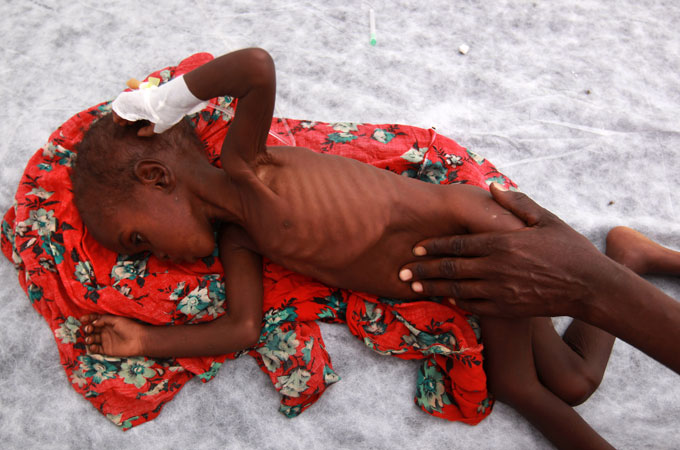Prioritising a solution to world hunger
Whatever the weather, world leaders can make extreme hunger a thing of the past, says writer.

 |
| The global food crisis could be solved if world leaders exerted enough political will, according to writer [GALLO/GETTY] |
The food crisis currently gripping East Africa may have been sparked by drought, but it takes more than dry weather to leave millions of people struggling for survival.
As well as the failed rains, a number of less visible factors have contributed to this disaster: high food prices, late response, insecurity, endemic poverty and distorted local economies have all contributed to the tragedy currently playing out across the region.
Keep reading
list of 4 itemsAfter the Hurricane
World’s coral reefs face global bleaching crisis
Why is Germany maintaining economic ties with China?
Aid agencies and governments have launched a massive emergency response to help those worst affected. But it is not enough, and unless the underlying causes of this crisis are tackled, it will happen again.
The new Charter to End Extreme Hunger, launched by a coalition of aid agencies at the United Nations in New York this month, outlines commitments that governments must make to prevent a repeat of this crisis.
Kenya’s Prime Minister Raila Odinga became the first leader to endorse the charter last week, setting an example which must be followed by governments around the world.
But for any leader, signing the charter is the easy part. Fulfilling the commitments it contains will take more than the flourish of a pen.
And yet they must be fulfilled. Early, smart responses to droughts can be the difference between life and death for their citizens. Rainfall predictions come months in advance, but in the run-up to the current crisis, such warnings were ignored.
If the warnings had instead triggered early action, thousands of people would have been saved at a fraction of the cost of today’s enormous aid operation. The lesson is simple; the longer the world waits to act, the higher the cost in both human and financial terms.
And if it is easy to see drought coming, it is no more difficult to spot those likely to suffer its effects. By targeting the poorest and most vulnerable communities with special support, governments can drastically reduce the number of people who need emergency aid when the rains fail.
Fair government investment is a key part of this protection. Travelling through East Africa, it is painfully obvious that many of the places hit hardest by the current crisis suffer from a lack of state spending. It is no coincidence that where roads end, hunger begins. World governments intent on tackling hunger must urgently work to address this inequality.
The price of food is another factor that has pushed thousands of people into hunger this summer. That too is something that in many contexts, governments are able to influence. The careful use of emergency food reserves can bring prices down, and by limiting the use of food export bans, global spikes in food prices can be better managed.
Finally, we must engage to end conflicts. It is not just bullets that kill in times of war; the food shortages resulting from conflict often leave people hungry and desperate. Vigorous diplomatic engagement to provide space for humanitarian aid in conflicts, and ultimately to bring them to an end, is a vital part of any serious plan to make hunger a thing of the past.
Hunger crises do not appear overnight; such situations are a long time in the making. By acting early and thoughtfully, their worst effects can be mitigated.
Meanwhile, as we watch the current wave of hunger ruin millions of lives in the East Africa, we must fight the temptation to see it as a natural disaster, like an earthquake or tsunami stretched in slow motion over many months. This dangerous misconception absolves governments of their responsibilities in preventing widespread hunger. Nature may have pulled the trigger on this crisis, but mankind loaded the gun.
Andrew Wander is Save the Children’s emergency media manager. Follow him on twitter at @andrewwander.
The views expressed in this article are the author’s own and do not necessarily represent Al Jazeera’s editorial policy.
